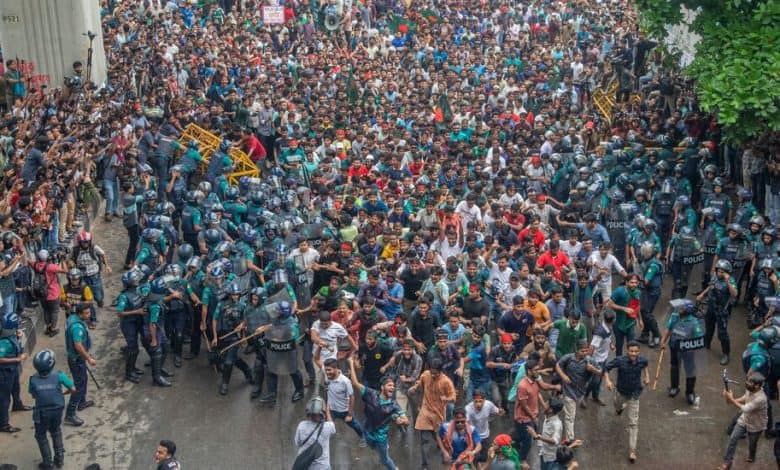Tens of Thousands of Students Protest Job Quotas in Bangladesh’s Streets

Tens of thousands of students blocked the main streets of Bangladesh’s capital, Dhaka, on Thursday, demanding that quotas for civil service jobs be abolished and those jobs given to candidates on the basis of merit.
The protests broke out after a Dhaka court recently reinstated quotas for government jobs, which were abolished by a government order in 2018 following another countrywide student protest. The appellate division halted the new ruling for four weeks on Wednesday, but that did not quell the demonstrations.
Protesting students blocked entry and exit points as well as key intersections in Dhaka, one of the world’s most crowded cities, causing major traffic congestion. The demonstrations also severely affected Dhaka’s only metro rail route.
Students broke a police barricade in Dhaka’s Shahbag area on Thursday evening to conduct a large sit-in. Some protesters also climbed police vehicles meant to disperse the disruptive gatherings.
“Due to the quota system, talented students cannot launch important jobs where talented people are required, like teaching at primary schools,” Akram Hossain, who was among the coordinators during the anti-quota movement in 2018, said in a phone interview.
Bangladesh reserves more than 50 percent of government jobs for quota holders, including the grandchildren of freedom fighters who took part in the country’s war of independence in 1971. Student leaders say those quotas are among many that are unacceptable now.
In 2018, students across the country staged demonstrations against the existing quota system, which guaranteed that quota holders would get more than half of government jobs. Following weeks of widespread protests, the government, led by Bangladesh’s longest-serving prime minister, Sheikh Hasina, announced that quotas would be abolished and government jobs would be awarded based on a merit system.
Mr. Hossain, the 2018 protest coordinator who attended Thursday’s demonstrations in Dhaka, said the current movement this time is more organized because six years ago students feared attacks from the student wing of the ruling party. He added that in 2018, organizers used fake social media accounts to spread the word about marches and other gatherings while dodging the government’s eyes.
Apart from the students of the University of Dhaka, the largest university in Bangladesh, students from other elite schools also joined protests in the cities Chattogram, Comilla, Rajshahi and Sylhet. Student leaders said police officers used bullets and batons to disperse protests at the Comilla University in Comilla, a southeastern Bangladesh city.
“We want the government to call for a special parliament session and take a decision about our demand,” Sarjis Alam, a coordinator of the current protests, said, his voice, strained and cracking from relentless chanting.
